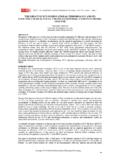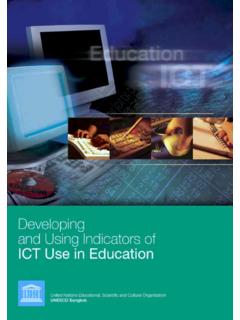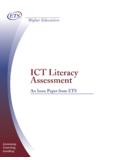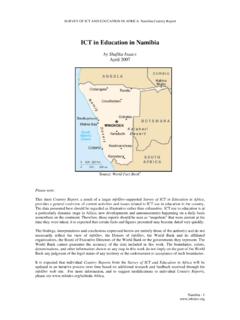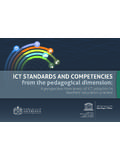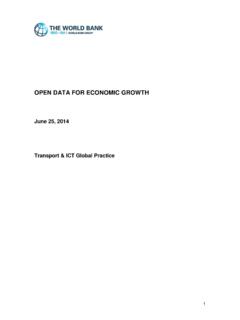Transcription of National ICT Policy - MACRA
1 Republic of Malawi National ICT Policy An ICT-led Malawi 2013 i TABLE OF CONTENTS Item Page FOREWORD ..ii PREFACE .. iii LIST OF ACRONYMS AND ABBREVIATIONS .. iv GLOSSARY OF TERMS .. v 1. INTRODUCTION .. 1 Background .. 1 LINKAGES WITH OTHER RELATED POLICIES .. 3 Problem DEFINITION .. 4 PURPOSE OF THE Policy .. 5 2. BROAD Policy DIRECTION .. 6 OVERAL Policy GOAL .. 6 OVERAL Policy OUTCOMES .. 6 OVERAL Policy OBJECTIVES .. 7 3. Policy PRIORITY AREAS .. 7 STRATEGIC ICT LEADERSHIP .. 8 HUMAN CAPITAL DEVELOPMENT .. 8 E-GOVERNMENT SERVICES .. 9 ICT IN INDUSTRIES .. 9 ICT INFRASTRUCTURE DEVELOPMENT .. 10 ICT IN THE PRIORITY GROWTH sectors .. 11 responsive ICT LEGAL, REGULATORY AND INSTITUTIONAL FRAMEWORK .. 11 PROMOTING National SECURITY .. 12 INTERNATIONAL 12 UNIVERSAL ACCESS OF ICT AND ICT RELATED 13 4. implementation strategy.
2 14 INSTUTIONAL 14 Obligations, responsibilities and performance accountability of MITA .. 15 IMPLEMENTATION PLAN .. 17 MONITORING AND EVALUATION .. 17 ii FOREWORD The development of the Information and Communications Technology Policy is part of the process Malawi, as a nation, has had to go through in her efforts to build a knowledge-based economy and information-rich society. Malawi is convinced that her economy can rapidly grow and diversify through participation in the information society. In order to fully benefit from the information revolution, Malawi needs to modernize various sectors of her economy using Information and Communications Technology (ICT). The ICT Policy , therefore, aims at providing a direction as to how Malawi will turn the ICT potential into real benefits for its people. It also aims at putting into place appropriate institutional, regulatory and legal framework that should effectively support successful deployment and utilization of ICT in all sectors of the economy.
3 The ICT Policy aims at mainstreaming ICT in all sectors of the economy to drive the implementation of the Malawi Growth and Development Strategy (MGDS) II. It is crucial that strong public-private partnerships exist in implementation of this Policy . The government will, therefore, continue to provide a conducive environment for both public and private sector participation in the development, deployment and utilization of ICT in both urban and rural communities. I sincerely thank all the people that have been involved in the development of this ICT Policy and ask them to also support its implementation at various levels. Dr. Joyce Banda PRESIDENT OF THE REPUBLIC OF MALAWI iii PREFACE Information and Communications Technology (ICT) is essential for the sustainable development of Malawi, considering the profound impact it has at both economic and social levels all over the world.
4 The ICT Policy aims at developing the ICT sector, promoting the development and use of ICT in all sectors and enhancing universal access to ICT services to achieve widespread socio-economic development. Implementation of the ICT Policy is encouraged by the prevalent political will existing in the country, which has seen the ICT sector being recognized as one of the priority areas with potential of turning around the economy. Growth of the ICT industry in the world has created unprecedented demand for electronic goods and services even within the country. However, Government of Malawi recognizes that implementation of the Policy may be affected by low levels of ICT literacy and awareness; dependency on imported goods and services; and competition for financial resources by other National priorities. The Policy was developed through a consultative process involving the private sector, government ministries and departments, the academia, development partners, non-governmental organisations, and other stakeholders.
5 Implementation of this Policy will require concerted team efforts of all partners concerned and especially those identified in the Policy . I, therefore, call upon all stakeholders to work with Government with dedication as we all strive to achieve the goals set in this Policy . Hawa O. Ndilowe (Mrs) CHIEF SECRETARY TO GOVERNMENT iv LIST OF ACRONYMS AND ABBREVIATIONS ICT Information and Communications Technology MACRA Malawi Communications Regulatory Authority MDGs Millennium Development Goals MGDS II Malawi Growth & Development Strategy II MITA Malawi Information Technology Agency TCP/IP Transmission Control Protocol/Internet Protocol UNECA United Nations Economic Commission for Africa UNDP United Nations Development Programme v GLOSSARY OF TERMS Broadcasting: any communication or transmission of any message or signal to the public by means of any electronic gadgets. e-Government Service: public service provided electronically by a Ministry or Government department, local authority, or body established by or under any law or controlled or funded by the Government.
6 ICT: (Information and Communications Technology) the technologies including computers, telecommunication, audio-visual systems, and postal systems that enable the collection, processing, transportation and delivery of information and communication services to users. Information Society: social, business and educational environment where individuals and organisations communicate and access the world s commercial, educational and entertainment resources over a universal network linking them together. Internet: an interconnected system of networks that connects computers via the Transmission Control Protocol Internet Protocol (TCP/IP) and includes future versions thereof. Local Content: information that emphasize the culture and language diversity of Malawi and are produced by or under Malawians control. Knowledge-based Economy: Is an economy which embraces development and utilisation of ICT in its socio-economic development activities.
7 Operator: a person or organisation that operates ICT facilities and/or services of telecommunications, broadcasting, IT applications, or postal services. Regulation: the process of ensuring that public utilities operate in accordance with legal rules. These rules may govern the offering of service by an operator and includes practices, classification and definitions. vi Telecommunication: any domestic or international transmission of information by wire, radio waves, optical media, or other electromagnetic systems, between or among points of user s choosing. Tele-density: Percentage of telephone users in a population. Universal Access: allowing everyone in the country to have access to ICT facilities within a reasonable distance and at a reasonable cost. Universal Service: a Policy of the Government to make ICT services, including advanced ICT services available throughout the country at affordable prices so that they are either available or easily accessible to anyone whenever they are needed, regardless of their geographic or physical location, and with due regard to people with special needs.
8 1 1. INTRODUCTION The National Information and Communications Technology Policy has been developed by Government of Malawi to give direction on ICT development in the country. The ICT Policy will support the National goal of wealth creation and reduction of poverty through sustainable economic growth and infrastructure development. The Policy is providing a framework for deployment, exploitation and development of ICT to support the process of accelerated socio-economic development in Malawi. Government will provide direction for systematic ICT program development, implementation, monitoring and review through this Policy . Government aims at consolidating an ICT approach for the mobilization, allocation and utilization of resources to realize institutional, community, sector and National development policies and strategies. This ICT Policy covers Information Technology (IT), Telecommunications, Broadcasting and Postal services.
9 The ICT Policy aims at guiding: a. The provision of ICT services in the rural areas and to the vulnerable groups; b. The investment in priority ICT areas; c. The Public Sector in the planning for the National development and utilization of ICT; and d. The formulation of an appropriate regulatory and legal framework aimed at safeguarding fundamental human rights, protecting privacy, promoting electronic services, and promoting competition in the ICT sector. BACKGROUND ICT has increasingly become one of the dominant factors affecting every facet of development not only in Malawi but the world over. Significant ICT advances are constantly taking place and continue to impact on socio-economic operations at various levels of society. ICT advances have brought about changes in the way business is conducted. At the moment nations and organizations are investing 2 more resources into the development and use of ICT in order to be more efficient and effective in their operations.
10 Malawi, as one of the developing economies in the world, has over the years faced a number of socio-economic challenges which are associated, among other things, with inadequate communication infrastructure, very low utilization of ICTs and lack of information. Major reforms in the ICT sector started in the 1990s through separation and commercialization of the then incumbent Telecom operator and Post Office into Malawi Telecom Limited (MTL) and Malawi Postal Corporation (MPC), respectively. These reforms were supported by the Communications Sector Policy and the Communications Act of 1998. In addition, through the Act, the Malawi Communications Regulatory Authority ( MACRA ) was established. However, with passage of time, the 1998 Communications Sector Policy has been overtaken by the significant developments in ICT. The Millennium Development Goals (MDG) report of 2011 for Malawi indicates that use of Internet by the population in Malawi improved from the low levels of percent in 2005 to 17 percent in 2011.


